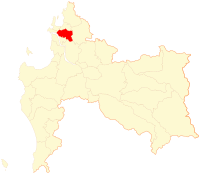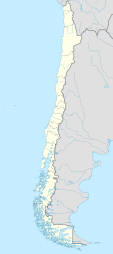Concepción
Concepción is the second city in importance of the Republic of Chile with 889,725 inhabitants (2002 census).
Concepción
La Concepción de María Purísima del Nuevo Extremo (original name) | |
|---|---|
| Nickname: Biobío's Pearl | |
| Motto(s): La Capital del Sur de Chile The Capital of the South of Chile | |
 Location of Concepción commune in the Biobío Region | |
| Coordinates (alcalde's office): 36°49′41.5″S 73°3′4.93″W / 36.828194°S 73.0513694°W | |
| Country | Chile |
| Region | Biobío |
| Province | Concepción |
| Founded | October 5, 1550 |
| Founded by | Pedro de Valdivia |
| Government | |
| • Type | Municipality |
| • Alcalde | Patricio Kuhn Artigues (2008-2012) (UDI) |
| Area | |
| • City and Commune | 222 km2 (86 sq mi) |
| Population (2006) | |
| • City and Commune | 292,589 |
| • Density | 1,318/km2 (3,410/sq mi) |
| • Metro | 1,322,581 |
| Demonym | Penquista |
| Time zone | UTC−4 (CLT) |
| • Summer (DST) | UTC−3 (CLST) |
| Post code | 3349001 |
| Telephone prefix | 56 + 41 |
| Website | Municipality of Concepción |
History
changeConcepción was founded by Pedro de Valdivia in 1550 north of the Bío-Bío River, at the site which is today known as Penco. At that time it was given the name Concepción del Nuevo Extremo. The new settlement of Concepción was just a few kilometers north of La Frontera (The Frontier), the boundary between Spanish territory and the land of the Mapuche, an American Indian ethnic group that remained independent until the 1870s. The settlement was formally recognized by the Spanish authorities as a town two years later by a royal decree. It was given a coat-of-arms that is still in use today.
Earthquakes and tsunamis, which razed the town in 1570, 1657, 1687, 1730 and 1751, led the authorities to move the town to its current site in the Valle de la Mocha, alongside the Bío-Bío River.
27 February 2010 Earthquake
changeOn February 27, 2010, an 8.8 magnitude earthquake struck the city of Concepción, killing more than 700 people and injuring thousands nationwide. Following the earthquake, geologists relying on global positioning satellite (GPS) data concluded that the city had been displaced roughly 3 meters (10 feet) to the west as a result of the event.[2] Fortunately, the city avoided the tsunami that followed the earthquake.[3]
Climate
changeThe climate of Concepción is classified as Köppen climate classification csb, with a dry summer nadir in February. It has an oceanic influence which keeps temperatures mild throughout the year. Wet snows are possible in winter, but snow does not remain for long. The chart at right provides a climate summary for Concepción.
Cultural life
changeTo an outsider, there may be confusion between the demonyms of the inhabitants of Concepción and the nearby city of Penco. Due to the previous location of Concepción being where Penco currently stands, inhabitants of Concepción are called penquistas while inhabitants of Penco are known as pencones.
Concepción is one of the most active cities in Chilean rock music and many famous rock groups in Chile started up in Concepción. cepción has the second largest concentration of universities in Chile, and is home to three major universities. Concepción currently has four traditional universities:
Gallery
change-
Arco de Medicina ("Arch of Medicine") on the campus of the Universidad de Concepción
-
Andes Tower
-
Mouth of the Bio-Bio emptying into the Pacific Ocean
-
Cathedral of Concepción; it was demolished after an earthquake on 1939.
-
BioBus, transport to a train station
-
Hotel Araucano
-
Plaza de la Independencia, the Plaza de Armas of Concepcion
Twin towns
changeBibliography
change- Ida Stevenson Weldon Vernon (1969) Pedro de Valdivia, Conquistador of Chile, Greenwood Press
- John Milton Nickles, Marie Siegrist (1965) Bibliography and Index of Geology Exclusive of North America, Geological Society of America, v.28
References
change- ↑ (in Spanish) "Municipality of Concepción". Retrieved 3 September 2010.
- ↑ CNN, "Chile quake moves city more than 10 feet", "9 March 2010" . Retrieved 10 March 2010.
- ↑ Time Magazine, "Quake Response Doesn't Live Up to Chile's Self-Image" Archived 2010-03-06 at the Wayback Machine, Eben Harrell, 4 March 2010 . Retrieved 4 March 2010.
Other websites
change- Concepción municipality (in Spanish)
- El Sur, newspaper of Concepción (in Spanish)
- Viveconce, Event schedule of Concepción (in Spanish)
- Octava, Website directory Archived 2022-01-22 at the Wayback Machine (in Spanish)
- HelloChile - Spanish tutoring and tourism in and around the city of Concepción, Information in English about the Chilean life and places to visit (in English)
- Municipal Library of Concepción (in Spanish)
- WorldFlicks in Concepción (Chile): Photos and places on Google Maps Archived 2012-01-15 at the Wayback Machine
- Concepción in the Encyclopedia Britannica (in English)


